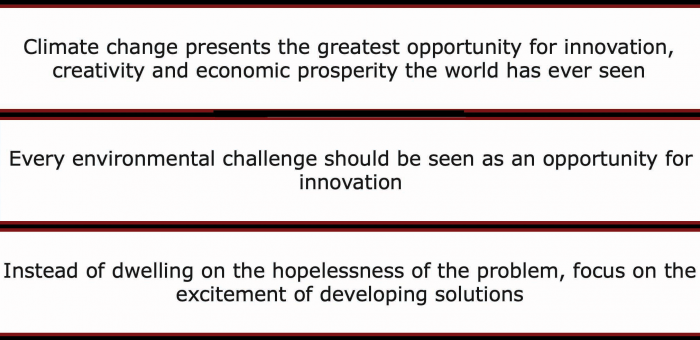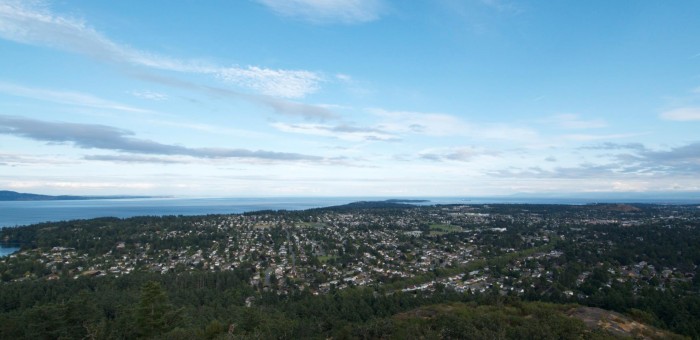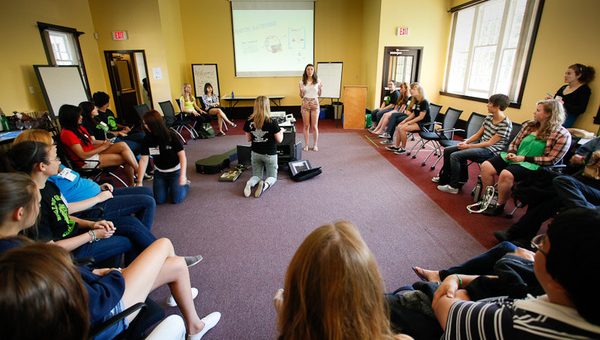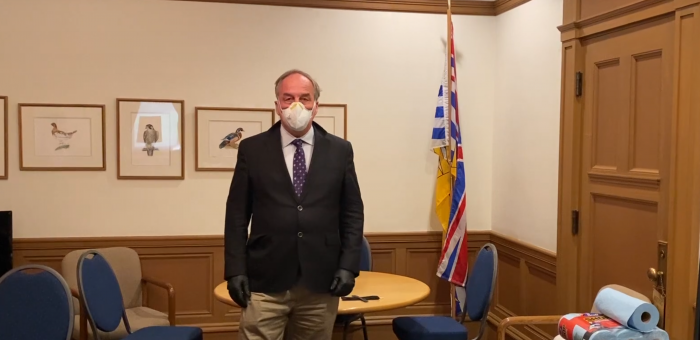Issues & Community Blog - Andrew Weaver: A Climate for Hope - Page 5
Moving on from Provincial Politics: A Climate for Hope
To bring closure to my 7 1/2 years as an MLA for Oak Bay-Gordon Head and 5 years as leader of the BC Green Party I felt it was important to add this video to my archived MLA website. Moving forward, I plan to continue my work on climate solutions on the local, provincial, national and international level.
This YouTube video was produced by Robert Alstead, the same person who created the documentary “Running on Climate”. That documentary provided an inside look into the 2013 election campaign set within a greater climate change narrative.
This YouTube video might be of interest to some as it gives insight as to why I got into and out of politics. The book that I refer to in this video has the working title: “A Climate for Hope” and not “A Vehicle for Change”.
Thank you to the Residents of Oak Bay-Gordon Head
With the announcement yesterday that the province is heading into a general election on October 24, my term as the MLA for Oak Bay Gordon Head has come to an end. This will be my last post on my MLA website.
I would like to thank you, the constituents of this fabulous riding, for extending me the great honour of serving you these last 7 1/2 years. It has been a very rewarding experience for me and I have been so very fortunate to have worked with outstanding constituency staff over this period. If you have contacted my constituency office, you too will have had first hand experience working with these exceptional individuals.
Thank you Judy Fainstein, Perry Fainstein, Devon deLarge, Allie deLarge, Rory Hills, Sarah Miller, Teresa Hartrick and Huxley Johnson.
Over the years I also had the privilege of working with first rate legislative staff. I was first elected in May 2013 and our small but mighty legislative team immediately immersed itself into building a BC Green presence in the BC Legislature. Thank you Taylor Hartrick, Evan Pivnick, Matt Wright, Sarah Miller, Claire Hume, Aldous Sperl and Judy Fainstein for your support during my first term: 2013 – 2017.
With the 2017 election delivering a minority BC NDP government and the BC Greens holding the balance of power, our legislative team grew. I remain grateful to the hard work of Liz Lilly, Macon McGinley, Judy Rendek, Stephanie Siddon and the legislative interns and volunteers who supported our office over the years.
Of course, I would never have been elected were it not for the hard work of the literally hundreds of volunteers who helped me in the 2013 and 2017 election campaigns. I ran on a promise to bring climate policy back to the forefront in BC. And with the establishment of CleanBC, I feel my work is done.
Finally, thank you to the candidates who have stepped forward to seek your vote to represent you as the MLA for Oak Bay Gordon Head in the upcoming election. From the quality of the candidates stepping forward, it is clear to me that our riding will be in good hands moving forward, regardless who wins the upcoming race.
Thank you again.
Andrew
Celebrating youth in our community – Olivia Friesen
This is the twenty-seventh installment in our series on exceptional youth where we celebrate the outstanding achievements of youth in the Oak Bay-Gordon Head riding. As we commence this chapter in our series we have chosen to celebrate the accomplishments of two sisters in Oak Bay, Olivia and Anna Friesen. These inspirational young adults are enriching our lives with their passion and commitment to the betterment of society.
Olivia Friesen
 Although many younger siblings would feel overwhelmed by the pressure of having an older sister as accomplished as Anna Friesen, Olivia has elected to view her older sister as a role model while still managing to distinguish herself as a different but no less remarkable young individual.
Although many younger siblings would feel overwhelmed by the pressure of having an older sister as accomplished as Anna Friesen, Olivia has elected to view her older sister as a role model while still managing to distinguish herself as a different but no less remarkable young individual.
In grade nine Olivia obtained marks of 100% in Social Studies and Science, 99% in math, and 96% in English. This past year, she followed up her incredible academic performance in her freshman year with an overall average in the upper 90s.
 Like her older sister, Olivia is a multidimensional athlete who has found success in nearly every sport she has decided to attempt. Last season, Olivia played on Oak Bay’s elite U16 Vancouver Island Premiere League team (which won their division) and was an important part of the high school junior girls’ team. She is also an excellent field hockey player who is a valuable member of school’s team and has been chosen to participate in the Rising Stars Elite Training Program. To top it off, Olivia runs the 100, 200, and 400 metre dash for the school’s track and field team and competes in long jump, triple jump, and pole vault.
Like her older sister, Olivia is a multidimensional athlete who has found success in nearly every sport she has decided to attempt. Last season, Olivia played on Oak Bay’s elite U16 Vancouver Island Premiere League team (which won their division) and was an important part of the high school junior girls’ team. She is also an excellent field hockey player who is a valuable member of school’s team and has been chosen to participate in the Rising Stars Elite Training Program. To top it off, Olivia runs the 100, 200, and 400 metre dash for the school’s track and field team and competes in long jump, triple jump, and pole vault.
 When she was in grade five, Olivia began playing the cello and has evolved to become an integral part of the Oak Bay High School Orchestra. In grade 9, her hard work and dedication was acknowledged by the Orchestra who decided to give her the Most Improved Strings Player Award. Additionally, while at Monterey Middle School, Olivia decided to take up playing the trumpet and is a now a member of the Oak Bay High School Concert Band.
When she was in grade five, Olivia began playing the cello and has evolved to become an integral part of the Oak Bay High School Orchestra. In grade 9, her hard work and dedication was acknowledged by the Orchestra who decided to give her the Most Improved Strings Player Award. Additionally, while at Monterey Middle School, Olivia decided to take up playing the trumpet and is a now a member of the Oak Bay High School Concert Band.
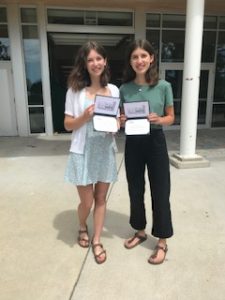 Despite her young age, Olivia has found numerous ways to give back to the local community and is an active member of the school’s environment club. This past year she helped to organize the rubber ducky race, volunteered as a Christmas gift wrapper for the Mustard Seed, and served as a volunteer for the school’s annual Cops for Cancer campaign. In previous years, Olivia has participated in restoration projects at Bowker Creek and Anderson Hill Park. When she was in grade nine, she was one of just six students in her year selected to participate in the Live Different program and would have travelled down to Mexico during spring break to build two houses for disadvantaged families if not for COVID-19.
Despite her young age, Olivia has found numerous ways to give back to the local community and is an active member of the school’s environment club. This past year she helped to organize the rubber ducky race, volunteered as a Christmas gift wrapper for the Mustard Seed, and served as a volunteer for the school’s annual Cops for Cancer campaign. In previous years, Olivia has participated in restoration projects at Bowker Creek and Anderson Hill Park. When she was in grade nine, she was one of just six students in her year selected to participate in the Live Different program and would have travelled down to Mexico during spring break to build two houses for disadvantaged families if not for COVID-19.
As her membership in the school’s environment club would indicate, Olivia is interested in climate change and conservation which she may pursue academically down the road in university. In line with her interests in environmental science, she cites science teacher Derek Schubsole as positive academic influence in her life.
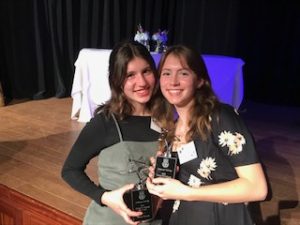 Throughout the COVID-19 pandemic Olivia has done her best to stay positive and keep a daily routine, but like many others, misses the personal interactions that form an important part of her everyday life. She’s looking forward to the start of the new school year after spending the summer working in the Kiwanis Willows Tea room.
Throughout the COVID-19 pandemic Olivia has done her best to stay positive and keep a daily routine, but like many others, misses the personal interactions that form an important part of her everyday life. She’s looking forward to the start of the new school year after spending the summer working in the Kiwanis Willows Tea room.
Given her personal drive and natural talent in so many different areas, we believe that Olivia is destined to continue being a high achiever whose work impacts the lives of numerous others.
Celebrating youth in our community – Anna Friesen
This is the twenty-sixth installment in our series on exceptional youth where we celebrate the outstanding achievements of youth in the Oak Bay-Gordon Head riding. As we commence this chapter in our series we have chosen to celebrate the accomplishments of two sisters in Oak Bay, Anna and Olivia Friesen. These inspirational young adults are enriching our lives with their passion and commitment to the betterment of society.
Anna Friesen
 Normally, my office and I prefer to chat with the youth we’re celebrating in person, but given the circumstances, we elected to conduct our conversation with the two sisters via Zoom. When we spoke to them in early August, they were vacationing at their family cabin in the Okanagan with their parents and family friends – one of whom is Logan Graham a young man we have recognized in the past (link to blog post on Logan to be added here).
Normally, my office and I prefer to chat with the youth we’re celebrating in person, but given the circumstances, we elected to conduct our conversation with the two sisters via Zoom. When we spoke to them in early August, they were vacationing at their family cabin in the Okanagan with their parents and family friends – one of whom is Logan Graham a young man we have recognized in the past (link to blog post on Logan to be added here).
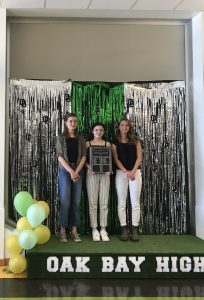 Originally from the Okanagan, Anna moved to Victoria in early childhood and attended Willows Elementary School and Monterey Middle School. Now entering her final year of high school at Oak Bay Secondary, Anna is one of the rare individuals with the natural talent and work ethic required to find success in multiple areas.
Originally from the Okanagan, Anna moved to Victoria in early childhood and attended Willows Elementary School and Monterey Middle School. Now entering her final year of high school at Oak Bay Secondary, Anna is one of the rare individuals with the natural talent and work ethic required to find success in multiple areas.
Throughout high school, Anna has consistently demonstrated that she is one of the top students in her grade. In grade 10, she obtained a remarkable 97% average with marks of 100% in math, social studies, and entrepreneurship. This past year, Anna somehow managed best her outstanding grade 10 performance by increasing her average to 98%. In grade 12 she will be taking a full load of math and science courses, including the calculus-math 12 combo, physics, biology, and chemistry. And she’s looking forward to the start of the new school year after spending the summer working in the Kiwanis Willows Tea room.
 Outside of the classroom, Anna is a gifted athlete who has performed at a high level in soccer, track, and volleyball. Winner of Oak Bay Secondary’s prestigious Female Athlete of the Year Award in 2019 – a trophy won by former Olympians – she was also the track team’s 2018 Rookie of the Year and won Most Outstanding Junior Track Athlete in 2019. And while she is clearly no slouch in the talent department, she is also a natural leader who is highly regarded by her teammates and coaches, evidenced by her role as captain of her Bays United soccer team.
Outside of the classroom, Anna is a gifted athlete who has performed at a high level in soccer, track, and volleyball. Winner of Oak Bay Secondary’s prestigious Female Athlete of the Year Award in 2019 – a trophy won by former Olympians – she was also the track team’s 2018 Rookie of the Year and won Most Outstanding Junior Track Athlete in 2019. And while she is clearly no slouch in the talent department, she is also a natural leader who is highly regarded by her teammates and coaches, evidenced by her role as captain of her Bays United soccer team.
 Although athletics and academics are big parts of Anna’s life, it quickly became apparent in our Zoom conversation with her that she is also passionate about music and fine arts. She is a dedicated member of the Jazz Band in which she plays the tenor saxophone and has taken visual arts and journalism as electives.
Although athletics and academics are big parts of Anna’s life, it quickly became apparent in our Zoom conversation with her that she is also passionate about music and fine arts. She is a dedicated member of the Jazz Band in which she plays the tenor saxophone and has taken visual arts and journalism as electives.
Despite being so busy with her pursuits in the classroom, athletics, and fine arts Anna has also found time to give back to the community. For the last year, she has been involved with Live Different Oak Bay, a group of students that would have travelled to travel down to rural Mexico to build two homes for disadvantaged families during spring break if not for the COVID-19 pandemic. Alongside the other Live Different members, Anna spent over one year volunteering in the Great Victoria community and helping to fundraise for the trip. In addition to Live Different, Anna has volunteered for Oak Bay’s Cops for Cancer campaign, served as a Mustard Seed Christmas Gift wrapper, and has spent time as a youth soccer coach.
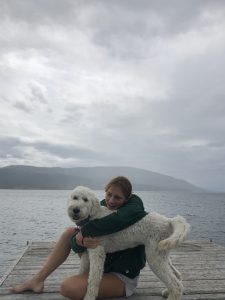
 Although Anna is quick to point out that there are many teachers who have had a positive influence on her during her time at Oak Bay, she particularly enjoyed taking history with Scott Alexander because of his interest in encouraging in class discussions about the course material and current events. Outside of school, Anna cites her parents and the Graham family as positive influences and role models in her life.
Although Anna is quick to point out that there are many teachers who have had a positive influence on her during her time at Oak Bay, she particularly enjoyed taking history with Scott Alexander because of his interest in encouraging in class discussions about the course material and current events. Outside of school, Anna cites her parents and the Graham family as positive influences and role models in her life.
With university fast approaching, Anna is looking to enter a discipline which combines her interests in science and fine arts such as architecture. Based on her strong track record of success so far, we have no doubt that Anna will excel in whatever program she ultimately chooses and look forward to hearing about her future accomplishments.
On the use of face masks to mitigate the spread of COVID-19
Today in the Legislature I rose during Members’ Statements to speak for two minutes about the scientific literature clearly demonstrating the efficacy of using face masks to stop the spread of COVID-19.
Following that I asked the Minister of Health if his government has any intention to implement a law or public health order making masks mandatory in all indoor and crowded spaces, outside of people’s homes, and if not, why not? I further asked the Minister if government does so choose to take this public mandate to require masks, how do they plan to implement and enforce said rules in the province of British Columbia?
Below I reproduce the video and text of both my Members’ Statement and Question Period exchange.
To demonstrate how easy it is to make a mask that has the potential to stop >95% of aerosol born virus transmission, I shot a quick video with how-to instructions below.
Video of Statement
Video of Question Period Exchange
Text of Statement
A. Weaver: I rise today to speak about some of the evidence concerning the efficacy of face masks as a mechanism to reduce the spread of COVID-19. Since the start of the COVID-19 pandemic, numerous studies have been conducted on the subject, and from this research, considerable evidence has emerged that mandating the use of masks in all indoor and crowded spaces outside people’s homes is a low-cost, high-reward measure that policy-makers could and should be pursuing.
To begin with, even though it is difficult to prove causation, we know that almost every nation that has seen widespread usage of face masks has fared better at limiting the spread of COVID-19 than those that haven’t. In many ways, this shouldn’t be surprising. Research conducted well before the current pandemic began — published in 2009 by Ben Cowling and others in the Annals of Internal Medicine — found that the combination of masks and hand hygiene significantly helped reduced the spread of influenza within households.
More recently a March 2020 study, published in the Journal of Medical Virology, showed that homemade masks made of simple four-layer kitchen paper and one layer of cloth can stop the transmission of more than 95 percent of the virus contained within aerosols.
Research directed by Cristopher Leffler from Virginia Commonwealth University — which is, admittedly, still undergoing peer review — has found that “social norms and government policies supporting the wearing of masks by the public as well as international travel controls are independently associated with lower per capita mortality from COVID-19.”
A comprehensive modelling study led by researchers at the University of Cambridge, in the U.K., published in the prestigious Proceedings of the Royal Society A, in June, concluded masks help to dramatically slow the transmission of the virus.
When taken together, mounting evidence is accumulating that the universal use of face masks is one of the most effective tools we have at our disposal to prevent the spread of novel coronavirus. While we await the holy grail of COVID-19 vaccine, it appears that making masks mandatory in all indoor and crowded spaces outside people’s homes can only aid British Columbia’s ongoing pandemic response.
To quote from the summary of the Proceedings of the Royal Society article: “My mask protects you. Your mask protects me.”
Question
A. Weaver: Well, thank you, hon. Speaker. I must say I’ve been here seven years, almost eight years, and this has set a new record. We’ve just finished three questions, and there are only four minutes left in question period. I’m not so sure this is the way this place is suppose to function, and I’m a little disappointed in my colleagues for taking that up and shoving me to the last couple of minutes of question period here. It’s unfortunate. The answers were not targeted, and the questions were rambling, in my view.
Anyway, as more and more evidence about the role that masks can play in reducing the spread of COVID-19 has emerged, growing numbers of jurisdictions have adopted laws making face masks mandatory in all scenarios where it will be difficult for people to remain physically distant. Just last week France introduced measures mandating masks in all enclosed public spaces. Across the pond, the U.K. began implementing a law that makes masks mandatory in grocery stores, shopping malls, post offices, banks and other busy establishments. Here in Canada, Quebec has made masks mandatory in indoor public spaces, while Toronto has established similar rules. And masks will be mandatory in indoor spaces in Nova Scotia, starting this Friday.
A recent poll from Angus Reid has found that there is broad provincial support for rules that would make masks mandatory in public spaces, with over 70 percent of British Columbians in favour of the changes. And although not all members of the public would be able to adhere to these rules, due to underlying physical or mental health conditions, the vast majority of the public would be able to follow them with relatively few personal costs.
My question is to the Minister of Health. Given the evidence in favour of universal wearing of masks and the broad public support for such a measure, will this government implement a law or public health order that makes masks mandatory in all indoor and crowded spaces, outside of people’s homes, and if not, why not?
Answer
Hon. A. Dix: I want to start by expressing my appreciation to the member for Oak Bay–Gordon Head for his consistent and thoughtful support for public health measures during this pandemic. It is much appreciated, and I thank him for his questions. He will know that Dr. Henry has answered this specific question a number of times in the past few weeks. Let’s see how I do, hon. Speaker.
You’ll know that, in July, we understand right now quite a bit about community transmission of COVID-19. That’s why we’ve taken specific public health measures — for example, public health measures to deal with houseboats, to deal with temporary accommodations, to deal with rental accommodations and resorts, to deal indeed with bars and with nightclubs and even with strip joints, and specific steps to deal with what is a significant issue in the agricultural industry.
Dr. Henry doesn’t believe, and I don’t believe at this time, that community transmission in B.C. justifies a mandatory mask mandate — not at this time. We think that it would not be justified in light of the significant challenges in both putting it into place and the very significant exemptions, which I know the member would understand, that would be required to do so.
He also knows — I know we have a little bit of time, he and I, for these questions, so I’ll just give him a little bit more information — that masks are, well, very important in terms of the hierarchy of measures we can take. It’s less effective than physical distancing and barriers and administrative measures. That said, Dr. Henry recommends, and I recommend, wearing a non-medical mask in circumstances where physical distancing cannot be maintained. I wear a mask in stores. I wear a mask in grocery stores. I wear a mask on public transit. I think, in these times, in particular in these times, wearing a mask is a reflection of good COVID sense but also a reflection of community respect. Many businesses, in fact, which have small spaces, are mandating masks within their businesses, within their COVID-19 plan.
I want to assure the member that this is our view for the moment, that we consistently have adapted based on the evidence, and we will continue to do so. The efforts of Dr. Henry, of public health, of the government and, indeed, of all the people of B.C. will continue to be founded on evidence and on science, and I know he appreciates that fact.
Supplementary Question
A. Weaver: I do note that the member opposite said my question was one minute and 30 seconds long. I just will say that, indeed, it was, and that we should have been able to have 20 such questions in this period, but we’re not getting to it.
I’d like to thank the minister for his response. I do appreciate government’s reservations about imposing a law that would make masks compulsory, and government should be commended for the job done so far in limiting the spread of COVID-19. But lurking in the background of discussions about masks and COVID-19 are concerns around the potential for government overreach. I understand that there’s a slow pace. However, we’re sitting in a once-in-a-century pandemic. Measures will need to be taken that will temporarily restrict some of our normal freedoms in order to preserve our collective safety.
One study, for example, that I referred to earlier in statements today, shows that even with a 50 percent efficiency, instead of a 95 percent type efficiency of most masks, you still get a lower R-rate number than you would without wearing masks. Since enforcing regulations around mandatory masks is frankly impossible for any government to handle by itself, many jurisdictions have appealed to the private sector to help with these rules, like in Quebec, for example, where periodic inspections happen in place, and in instances where individuals or businesses are caught, authorities have typically been empowered to apply fines.
My question is once more to the Minister of Health. If the government does so choose to take this public mandate to require masks, how do they plan to implement and enforce said rules in the province of British Columbia?
Answer
Hon. A. Dix: As noted, and this is the strong view of public health, with Dr. Henry, and it’s my strong view, at the moment, a mandatory mandate for masks is not required, is not desirable in British Columbia for some of the reasons that we have discussed at length and I’m happy to continue to discuss, because I think it’s an issue of public interest and debate. I applaud people who take the steps, because I think it’s an act of respect to wear non-medical masks, especially in areas where physical distancing can’t be maintained. That is of vital importance, and it is part of our collective response to COVID-19.
What we’re going to continue to do in B.C. is follow the science and follow the evidence in our pandemic. Yes, what happens in Quebec and what happens in France and what happens in Alberta is important, but one of the reasons we have been successful in B.C. is a determination also to follow our own B.C. course to deal with our own B.C. pandemic. That led to our response and our single-site order in long-term care. It led to our action, different from other jurisdictions, in dealing with temporary foreign workers in agriculture. I think these sorts of steps, which demonstrate a commitment to public health and to breaking the chains of transmission have been what have made us successful.
But I want to say this. I appreciate the comments of the hon. member, and I want to take this opportunity to thank all of the members of the House, as people have consistently made positive suggestions, been supportive.
This has been our response, our collective response to the COVID-19 pandemic, and it has been successful so far, I think, with extraordinary challenges and with some considerable losses. But we need to continue to do this together. There are weeks and months and maybe years to come. That will require generosity and positive spirit
Draft Segment 014
response to the COVID-19 pandemic, and it has been successful so far, I think, with extraordinary challenges and with some considerable losses.
We need to continue to do this together. There are weeks and months and maybe years to come, and that will require generosity and positive spirit together to continue to do that. So I encourage people to make suggestions, to engage in public debate on these issues, but mostly to be respectful of one another and for all of us to take our responsibility, as the government is, as we as a Legislature are, in breaking the chains of transmission of COVID-19 in B.C.

